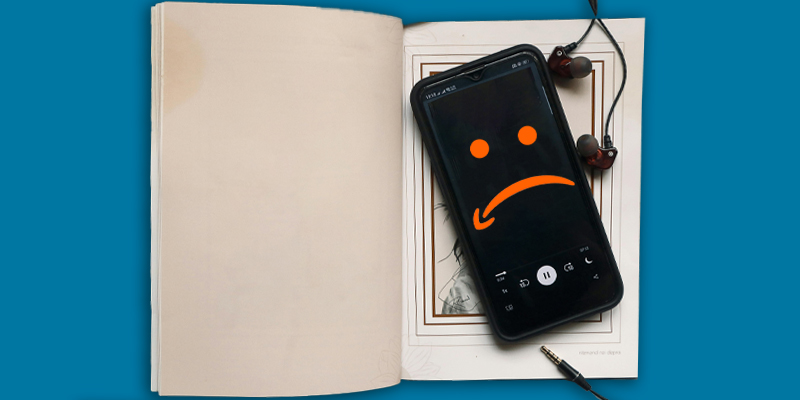May 14, 2025, 4:13pm
Audible announced yesterday that they’re going to start rolling out AI narration and translation, according to The Guardian and their own press release. It’s another use of AI that not many people seem to be asking for, but the sort of thing every tech company seems eager to force on consumers.
As usual, this announcement is given the gloss of accessibility and excess: the consumer will get more, and AI holds the promise of a bright future that’s only just around the bend, pinkie swear. Audible’s CEO is quoted saying things like “expand the availability of audiobooks,” “offering customers every book in every language,” “bring more stories to life,” and so on.
I don’t trust AI to do this job well, but my colleague Drew pointed out that since these programs have a tendency to glitch out and invent—hallucinate, if you prefer to imagine the algorithm dreaming—then there’s a non-zero chance that these programs could edit or rewrite the book they’re translating to audio or another language. If left alone to interpret a text, who’s to say a confused large language model won’t hit a snag and starting inserting other books, or Reddit AITA threads, or old Jimmy Carter speeches into your Audible copy of Madame Bovary?
Like all AI ventures, Audible is promising a lot to customers and publishers, including all kinds of options in terms of production, voices, and languages, but the common thread is the replacement of human workers with a prediction algorithm.
Kristin Atherton, a narrator of over 400 audiobooks, told The Guardian that AIs simply can’t do what human readers can:
“The art—and it is an art—of a good audiobook is the crack in the voice at a moment of unexpected emotion, the wryness of good comedy timing, or the disbelief a listener feels when one person can convincingly be a whole cast of characters,” she explained. “No matter how ‘human’ an AI voice sounds, it’s those little intricacies that turn a good book into an excellent one. AI can’t replicate that.”
Nichola Smalley, a translator from Swedish and Norwegian into English, was more succinct: AI models “produce a glut of mediocre results that no one really wholeheartedly enjoys.”
AI is simply not very good. In addition to the massive environmental waste of AI, its energy usage, and the fact that AI models are built using stolen art, these companies have also not yet built anything that people are excited about. The only folks who seem onboard are LinkedIn MBA bros, freaks who are trying to game dating apps, and students trying to get homework done more quickly. None of this is a threat to art—I’m not worried that AI will replace human creativity in the near or long term. But I am afraid it will play on our laziness and distractibility to make us less social, less engaged, and less employed. The real threat is that AI will be the justification for firing a lot of humans. AI may be incompetent at nearly everything it does, but it must be taken seriously as a labor issue.
We’re talking about Amazon, after all, so it should be no surprise that AI narrators threaten a unionized workforce. This is the Bezos playbook: to reintroduce a Fordist approach that treats human workers as interchangeable with software or robotics. There’s a grim detail in the Guardian piece about where Amazon imagines human workers fitting in: AI translations will include “an option to use human professional linguists to check translation accuracy.” It’s an incredible misunderstanding of the work translators do, and a horrible vision of a new catagory of workers, whose job is to clean up behind AI.
Do you really want to be fired by an uncreative and overly credulous manager, and then go home to decompress by turning on a spreadsheet that reads you to sleep? It doesn’t have to be like this, and we don’t have to accept the future they’re offering us.
